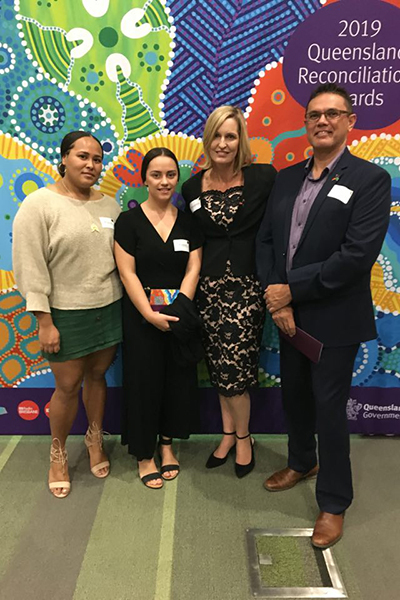Deadly Start earns a highly commended in this year’s Reconciliation Awards

Metro North’s Deadly Start program was Highly Commended in the partnership category of the Queensland Reconciliation Awards. Pictured at the awards are accepted by Cecilia Anson, Tamika Kai Birch, Vivienne Hassed and Paul Drahm.
If you’ve noticed a few young people wearing Deadly Start t-shirts around our hospitals and dental clinics this year, chances are they’re part of our inaugural class of school-based trainees, who are learning and earning on site while completing their senior school studies.
The Deadly Start education2employment program partnership between Metro North, Brisbane North West Trade Training Centre, Mater Education and OSMAC has just landed a highly commended in this year’s Reconciliation Awards, for its contribution to Closing the Gap.
Deadly Start student Cecilia Anson has been spending one day per week working in Women’s and Newborns and intends on doing a university degree in nursing, before one day taking her skills back home to her community in the Torres Strait.
“I know that my community would be really proud of me to get all of these qualifications and come back to the island and practice,” Cecilia said.
“The nurses inspired me to understand more about how you can help people. Some of the things I’ve learnt already are how to talk to a patient in bed, making their beds and how even having a crease in their bed can cause a lot of damage to them,” she said.
The program has been designed to inspire, educate, engage and motivate Indigenous students through a culturally-supported education journey into their dream health career through a school-based traineeship in nursing, allied health and dental.
MNHHS Indigenous Midwife Sonita Giudice couldn’t wait to become involved with the new program, to provide essential guidance and mentorship to students like Cecilia in caring for new mums.
“My own journey into health was guided and shaped by elders who taught me valuable lessons on our cultural history, and this is something I now take into my own work at the Ngarrama Midwifery Group Practice,” Ms Guidice said.
“Understanding this shared culture is crucial when it comes to caring for our Indigenous patients, so this program is two-fold. It gives young Indigenous kids much greater opportunities to have careers in the health sector, while helping us build the workforce we need to provide culturally-appropriate care for our Indigenous patients,” she said.
“I’m very proud to be involved in this program, and to continue sharing the knowledge with a new generation of young workers, that has been shared with me,” she said.
With a long-term focus on creating a sustainable Indigenous workforce who can deliver culturally-appropriate care to patients; and to improve health, education and career outcomes for Aboriginal and Torres Strait Islander peoples, the team is hoping to build the program to recruit hundreds of students over the coming years.
